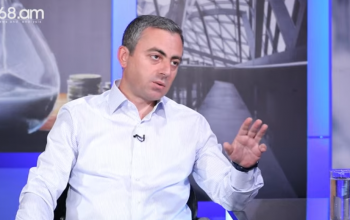Armenia condemned Israel’s overnight airstrikes on military and nuclear-related sites across Iran on Friday, warning that the aggressive military action risks igniting a wider regional conflict with direct consequences for the South Caucasus.
In a statement, Armenia’s Foreign Ministry criticized the attacks as reckless and destabilizing.
“The unilateral attack against Iran is deeply concerning,” the ministry said. “Taking place ahead of the next round of negotiations, it endangers peace efforts as well as regional and global security.”
“We condemn such actions and call for the immediate cessation of hostilities and adherence to international law,” it added.
The strikes — carried out without international mandate or regional coordination — hit key military sites including Islamic Revolutionary Guard Corps (IRGC) infrastructure and civilian areas in Tehran and other cities, according to Iranian media. Israel claimed the assault was “preemptive” and aimed at halting Iran’s nuclear program, despite longstanding international disagreement over the nature and imminence of that threat.
Iranian Supreme Leader Ayatollah Ali Khamenei vowed retaliation, stating that Israel “has set itself up for a bitter and painful fate.”
Security analysts in Armenia have raised alarms about the potential blowback from escalating conflict between Israel and Iran, particularly given Armenia’s geographic and strategic position. Iranian-Armenian cooperation has served as a counterbalance to Turkish and Azerbaijani pressure in recent years, especially in the sensitive Syunik province, which borders Iran and remains the subject of geopolitical friction.
“There is no scenario in which an expanded military conflict involving Iran leaves Armenia untouched,” said one regional analyst. “Instability in Iran weakens one of the few deterrents to Azerbaijani adventurism and endangers a key lifeline for Armenia’s economic and strategic security.”
While senior Armenian officials, including Security Council Secretary Armen Grigoryan, echoed concerns about the violation of Iranian sovereignty and the risks of escalation, many critics point to Armenia’s own diplomatic paralysis and the lack of a proactive regional policy capable of mitigating these risks.
The airstrikes have already affected air travel, with commercial flights between Yerevan, Tehran, and Tel Aviv canceled amid fears of further escalation.
Despite mounting regional instability, Prime Minister Nikol Pashinyan traveled to the Czech Republic on Friday to attend an international forum, drawing quiet criticism from observers who view the trip as poorly timed and reflective of Yerevan’s limited capacity to respond to fast-moving geopolitical developments.
For Armenia, the implications of another Western-backed military operation in the region are clear: heightened insecurity, further erosion of regional balance, and the increasing isolation of smaller states caught between larger powers.




